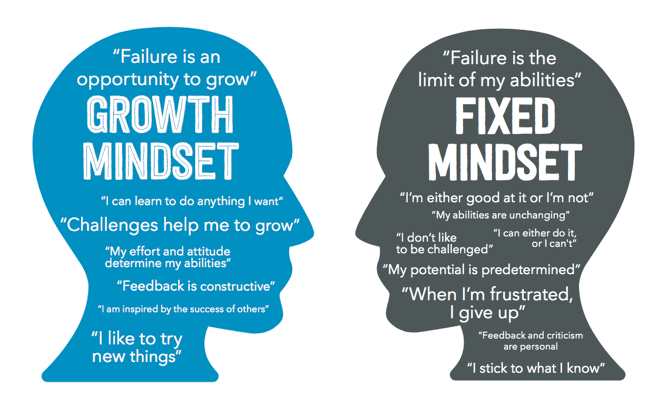Over the years, I have frequently been asked by parents what they can do to help their children in school. My answer has varied over the years, but I am now convinced that one of the most important things parents can do for their children is to help them to have a growth mindset.
Psychologist and researcher, Carol Dweck, published a book entitled Mindset, in which she describes two mindsets – fixed and growth. A fixed mindset is the belief that a person’s intelligence and talents are fixed from birth and are unchangeable. A growth mindset is the belief that a person’s intelligence and abilities can be cultivated and developed through personal effort, strategy, and persistence. Dweck explains that the secret of success in life is not about having a high IQ or even an amazing talent, rather, it is about having a growth mindset that sees setbacks as challenges to overcome, and difficulties as opportunities to grow.
Students with a growth mindset see difficulty at school as a temporary roadblock that can be overcome by working at it and persevering. Students with a fixed mindset see difficulties at school as a confirmation that they aren’t as smart or as talented as they thought they were, and see no point in trying. For example, a student with a fixed mindset who fails a math test might think, “I am just bad in math, I will never be able to do this.” A student with a growth mindset might think, “I know I can do this but I really need to learn my multiplication facts. I will work on my math facts and I will get better in math.”
We, as parents and teachers, play a big role in the mindset that our children hold. The things that we say and do send a message to our kids. We must consider how we praise them. Do we praise them for their effort or for their talent? We must consider how we talk to them when they confront a setback. Do we express disappointment in them or make excuses for them, or do we give them constructive feedback and encourage them to keep trying? Consider what expectations we have for our children. Do we really believe that they can change and grow? Do we understand as the Apostle Paul stated that “suffering produces perseverance; perseverance, character; and character, hope” (Rom. 5:3-4)?
One of my favorite children’s books is the classic story, The Little Engine That Could, by Watty Piper. It tells the story of a train loaded with toys and treats to take to children waiting on the other side of the mountain, but the engine develops a problem and cannot pull the train any farther. Several big train engines pass by but refuse to help; finally, a small blue switch engine comes by and agrees to pull the train over the mountain. The Little Blue Engine was hitched to the train and began pulling. “She tugged and pulled and tugged and slowly, slowly, slowly they started to move.” As the Little Blue Engine strains to pull the train up the mountain, puffing and chugging, she says, “I think I can—I think I can—I think I can…” The train finally makes it to the top of the mountain and then easily descends to the valley below chugging, “I thought I could. I thought I could. I thought I could. I thought I could.”
The Little Blue Engine was not the biggest or the strongest engine around, and she wasn’t even designed to pull a whole train. What the Little Blue Engine had was a growth mindset. She saw the mountain as a challenge to be overcome with great effort and persistence. We need our children, when confronted by a challenge or even a failure, to see it as something to be overcome because “they think they can.”
 Blessing,
Blessing,
Mara Ashley
Elementary Principal
Photo found at https://cdn-images-1.medium.com/max/1600/1*PQBc8JCD5yu4x2wxCCGU1g.png
